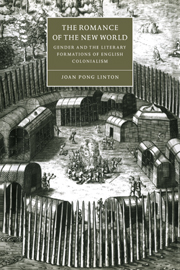Book contents
- Frontmatter
- Contents
- Acknowledgments
- Introduction
- 1 Love's laborers: the busy heroes of romance and empire
- 2 Sea-knights and royal virgins: American gold and its discontents in Lodge's A Margarite of America (1596)
- 3 Jack of Newbery and Drake in California: domestic and colonial narratives of English cloth and manhood
- 4 Eros and science: the discourses of magical consumerism
- 5 Gender, savagery, tobacco: marketplaces for consumption
- 6 Inconstancy: coming to Indians through Troilus and Cressida
- 7 The Tempest, “rape,” the art and smart of Virginian husbandry
- Coda: the masks of Pocahontas
- Notes
- Works cited
- Index
- Cambridge Studies in Renaissance Literature and Culture
Introduction
Published online by Cambridge University Press: 06 November 2009
- Frontmatter
- Contents
- Acknowledgments
- Introduction
- 1 Love's laborers: the busy heroes of romance and empire
- 2 Sea-knights and royal virgins: American gold and its discontents in Lodge's A Margarite of America (1596)
- 3 Jack of Newbery and Drake in California: domestic and colonial narratives of English cloth and manhood
- 4 Eros and science: the discourses of magical consumerism
- 5 Gender, savagery, tobacco: marketplaces for consumption
- 6 Inconstancy: coming to Indians through Troilus and Cressida
- 7 The Tempest, “rape,” the art and smart of Virginian husbandry
- Coda: the masks of Pocahontas
- Notes
- Works cited
- Index
- Cambridge Studies in Renaissance Literature and Culture
Summary
In books eleven and twelve of Albions England (1612), William Warner celebrates Tudor voyagers as builders of England's commercial empire. This celebration is intertwined with a story featuring the medieval traveler Sir John Mandeville as a chivalric knight whose feats abroad win him both fame and the hand of Elenor, cousin of Edward III. Through this double narrative, Mandeville becomes the romantic precursor of Tudor voyagers, especially those who performed “enterprises rare” in service to the “Maiden Empresse,” Elizabeth I. Warner is politically astute in mixing romance with an imperial vision. After all, as Stephen Orgel points out, Elizabeth's royal image is deeply invested in a chivalric fiction that defines “the essence of knighthood [as] service to a lady.” Nor is Warner alone in this practice. In The Discovery of Guiana (1595), Sir Walter Ralegh presents himself as Elizabeth's knight traveling with a miniature portrait of his beloved queen and showing it to the natives he encountered. Ralegh saw the Discovery as a means of winning Elizabeth's support for his proposal to colonize Guiana. Although Ralegh failed in his purpose, English commercial and colonial motives clearly find expression in the romance themes of chivalric love and adventure in other worlds.
The interplay between the romance and colonial discourse, which the writings of Warner and Ralegh illustrate, is the subject of this study. This discursive interplay is especially lively because both popular romances and New World narratives were products of print, and had gained currency within a shared nexus of production and readership.
- Type
- Chapter
- Information
- The Romance of the New WorldGender and the Literary Formations of English Colonialism, pp. 1 - 12Publisher: Cambridge University PressPrint publication year: 1998

